Mark Zuckerberg’s Banal AI Vision
May 2, 2025
Mark Zuckerberg’s Banal AI Vision for Meta
Things you buy through our links may earn Vox Media a commission.
7:00 A.M.

Photo-Illustration: Intelligencer; Photo: Dwarkesh Podcast
Meta, along with a few of its other peers in big tech, is in an enviable place. Like Google and Microsoft, its core business — in Meta’s case, advertising across its popular platforms – is doing extremely well. Also like Google and Microsoft, however, it’s investing breathtaking amounts of money in AI and openly imagining a near-term scenario in which its core business instead revolves around products and consumer habits that haven’t yet come into view.
Meta can afford to make these investments now because it’s raking in cash: it made more than $16 billion of profit last quarter, which puts its plan to spend “$64 billion to $72 billion” this year on capital expenditures, mostly meaning AI, into perspective. As for how it’ll make that money back in the future, the company has been vague, even by the low-clarity standards of the AI race. It’s easy enough to imagine how Microsoft, a company that makes most of its money from productivity software, might sell AI assistants. Meta, on the other hand, has historically made money selling ads on platforms where human beings interact with each other about things they care about as people. Where do chatbots fit into that, and how might they be worth tens of billions of dollars?
In an interview with Dwarkesh Patel, Zuckerberg finally tried to explain. AI is “almost certainly going to unlock this massive revolution in knowledge work and code,” he said, mentioning that companies like Anthropic and OpenAI were targeting enterprise customers. “I also think it’s going to be kind of the next generation of search and how people get information and do more complex information tasks,” he said, disclosing that most of Meta’s current AI use happens in WhatsApp, where people — mostly non-Americans — use it like ChatGPT.
But the real case use for AI within Meta will arrive on more familiar terrain, Zuckerberg argues, describing human interaction as only the longtime head of the world’s leading attention conglomerate could:
I also think it’s going to be fun. I think people are going to use it to be entertained. And, you know, a lot of the internet is like memes and humor, right? And we have this like amazing technology at our fingertips and it is sort of amazing and kind of funny when you think about it, how much of human energy just goes towards entertaining ourselves and pushing culture forward and finding humorous ways to explain cultural phenomena that we observe. I think that that’s almost certainly going to be the case in the future, right?
Delivery aside, Zuckerberg’s claim here is pretty straightforward: For Meta, AI is a way to produce and allow users to engage with content, and a way to extend the ways that people already use its platform. Some of this content will resemble direct human interactions, while other content will resemble media. Zuckerberg says that despite current stigmas, people will become more comfortable interacting with chatbots in personal ways, and that “we will find the vocabulary as a society to be able to articulate why that is valuable.” (This is plausible, but so is a scenario in which the “vocabulary” society finds is that of pathology and addiction.
To monetize, Meta will mostly just do what Meta already does. “For the consumer piece, we definitely want to have a free thing,” Zuckerberg said. “And I’m sure that will end up being ad-supported.” As for what these ad-supported and AI-enhanced feeds might eventually look like Zuckerberg got speculative:
You’ll be scrolling through your feed and there will be content that is basically, I don’t know, maybe it looks like a Reel to start, but then you talk to it or you interact with it, and it talks back or it changes what it’s doing or you can jump into it like a game and interact with it… that’s all going to be AI.
It’s worth backing up and trying to see the world — or at least Meta’s products — as Zuckerberg might. In recent years, driven in part by the popularity of TikTok, social media has shifted away from the social and into media, gradually turning platforms founded on user interactions into more passive channels for consumption. In a recent testimony during the FTC’s antitrust trial against Meta, highlighted by The New Yorker, the company shared that the “percent of time spent viewing content posted by ‘friends’” had declined to just 17% on Facebook and 7% on Instagram, and that the company’s platforms served “the general idea of entertainment and learning about the world and discovering what’s going on.” That people aren’t using public social platforms to communicate with one another is something Meta might see as a problem AI could solve; that people are instead using social media to consume lots of content is something Meta might see as an opportunity that AI could be used to exploit further. (The company is also approaching AI social media from the other direction; it included a “Discover feed” in a standalone chatbot app launched this week.)
Taken together, this vision is indeed “kind of funny when you think about it.” Zuckerberg imagines media platforms in which other people are augmented or replaced by chatbots trained on their collective data, with all parties involved coming together to engage with content produced by AI tools trained on “cultural phenomena,” in a space arranged according to opaque and automatic logics. It might seem like a strange destination for the company that built its empire on real-name social networking, but it can also be understood, less fantastically, as the culmination of years of optimization and automation in pursuit of content that’s cheaper, more plentiful, better targeted, and more engaging. What is an algorithmic newsfeed, or an infinite scroll of Reels, if not the automation of formerly human curation? What is Facebook AI slop if not the platform’s remaining participants identifying and meeting user demands with automation? With fewer friends posting on Instagram, and those still present engaging primarily in private consumption, what is a “Like” if not a signal for an automated system, an interaction with a machine that “talks back or changes what it’s doing” by showing you more?
Meta’s AI strategy less resembles a bet on an unrecognizable future than a belief, or a wish, that it can simply be Meta, but more so.(It’s also a bet that Large Language Model-based AI will present more opportunities for entertainment than for work.) Zuckerberg isn’t just envisioning a Meta staffed by AI engineers and AI moderators, but platforms that stock themselves with content, allow users to request whatever types of interactions they want, and are even more effective at holding attention, keeping people engaged, and, of course, serving and targeting advertising.
Mark Zuckerberg’s Banal AI Vision
Things you buy through our links may earn Vox Media a commission.
THE FEED

the law
Trump Has Many Immigration Abuses. The Cases Against the Two Judges Aren’t That.
In a moment when lines are being crossed, it’s important to recognize when they are not.

the power trip
John Fetterman’s Struggle
The senator insists he is in good health. But staffers past and present say they no longer recognize the man they once knew.

early and often
Marco Rubio Might Have His Jobs, But He’s No Henry Kissinger
Rubio is now both secretary of State and national security adviser, like Kissinger. This just shows his shows his pliability, not his power.

tremendous content
Trump Desperately Wants New Air Force One, Gets Used Plane Instead
Boeing’s Air Force One project is so overdue and over budget that Trump is settling for a jet previously used by the Qatari government.

early and often
Pritzker’s Total-War Message Is a Hit Among Angry Democrats
The Illinois governor turned the volume up to 11 in his searing anti-Trump speech, putting himself at the top of the 2028 pack.

trump 2.0
Qatar and the Emirates Are Dumping Money on the Trumps
Who needs to worry about conflicts of interest when you get a ridiculous amount of money?

trump 2.0
Mike Waltz Demoted to UN Ambassador After Signalgate
The former national security adviser is now leading the charge at the United Nations after his group chat disaster last month.
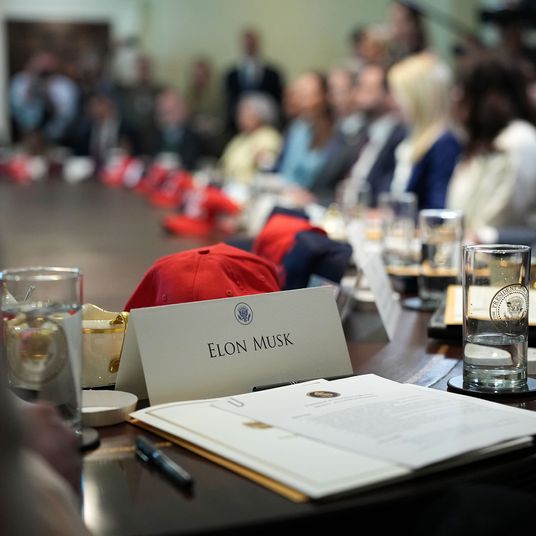
politics
Elon Musk Is Winding Down His Work Destroying the Government
Musk said he will be focusing mainly on his companies, not DOGE, and denied a report that Tesla’s board is considering finding a new leader.

royals
How Are King Charles & Kate Middleton Doing? Latest Health Updates.
Here’s the latest on Charles and Kate’s cancer battles, and how the royals are coping.

early and often
GOP Plots Sneak Attack on the Obamacare Medicaid Expansion
Congressional Republicans need to cut Medicaid to pay for Trump’s agenda. Under their latest proposal, millions would lose health insurance.

trump 2.0
Are Smoke and Lead Bad for You? Really, Who Can Say.
Scientific research journals are being put out of business.
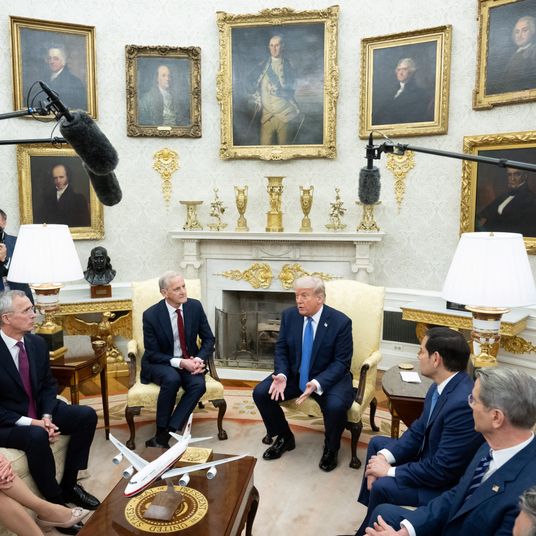
tremendous content
All of Trump’s Tacky and Trollish White House Renovations
From replacing Obama’s portrait to paving over the Rose Garden, Trump’s décor changes reflect his second-term quest for dominance and revenge.

screen time
ChatGPT Wasn’t Supposed to Kiss Your Ass This Hard
But sycophancy is a core part of any chatbot’s business model — and part of what makes them potentially dangerous.
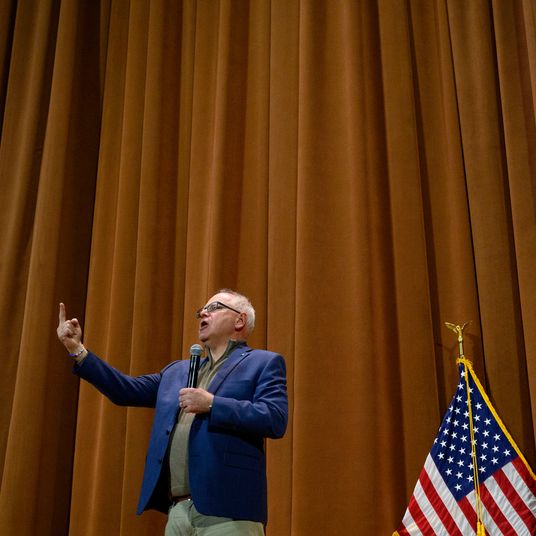
american affairs
‘Dark Woke’ Is Cringey
At best, the Democrats’ new catchphrase feels like a cheap trick.

politics
Freed Columbia Student to Trump: ‘I’m Not Afraid of You’
A judge ordered the immediate release of Mohsen Mahdawi, who was arrested during a citizenship interview, as his case proceeds.

math
Pam Bondi Says Trump Has Saved 258 Million American Lives
That’s “million” with an m.
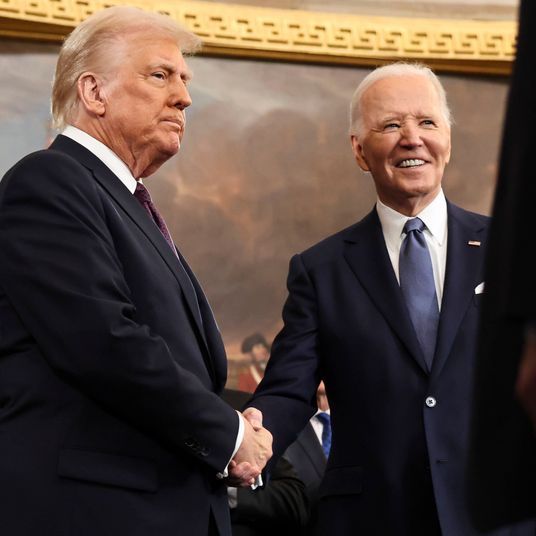
early and often
Trump’s Megalomania Undermines Biden Blame Game
As markets gyrate, the economy lurches toward stagflation, and polls tank, it’s too late for the 47th president to blame his predecessor.

politics
Trump Says He Doesn’t Feel Like Returning Abrego Garcia
In a tense interview with ABC News, President Trump undercut his administration’s legal position on the high-profile case.
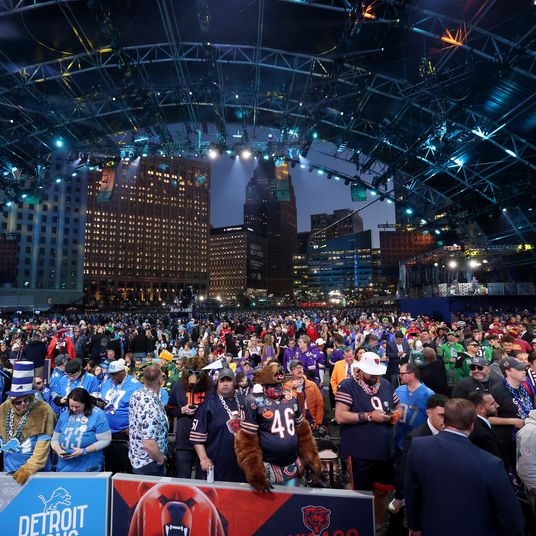
games
The Refs Are Not Trying to Screw You
The Knicks officiating controversies are another example of grievance culture taking over sports.

foreign affairs
Trump and Bukele’s Concentration Camp
CECOT is no regular prison. It is also a warning.
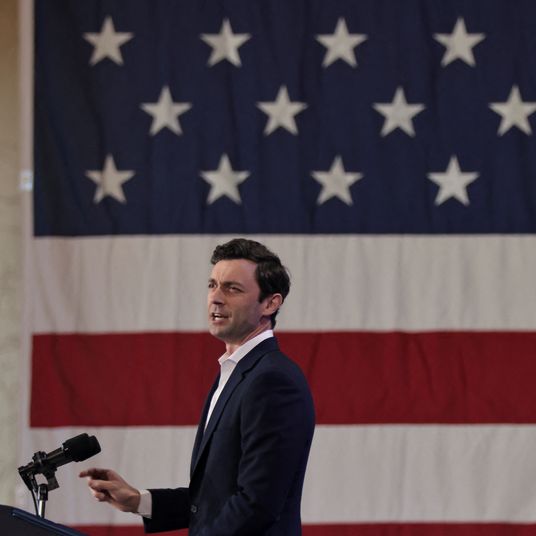
early and often
Will Trump Be Impeached a Third Time?
If Democrats flip the House next year, the case for a third impeachment will be stronger than the first two, even though a conviction is unlikely.

poll position
At 100 Days, Trump Approval Rating Is As Low As First Term
After a short time back in office, the 47th president has used up most of the political capital that made his comeback possible.

politics
Amazon May Be Off Enemies List After Trump/Bezos Phone Call
Amazon appeared to walk back a plan to display an item’s tariff costs following a phone call from President Trump to Jeff Bezos.

early and often
Trump Is Bad for Your Health Care, But Health Care Is Bad for Trump
His agenda depends on Medicaid cuts, which could prompt a 2017-like backlash.
You’ll receive the next newsletter in your inbox.
*Sorry, there was a problem signing you up.
Search
RECENT PRESS RELEASES
Related Post



